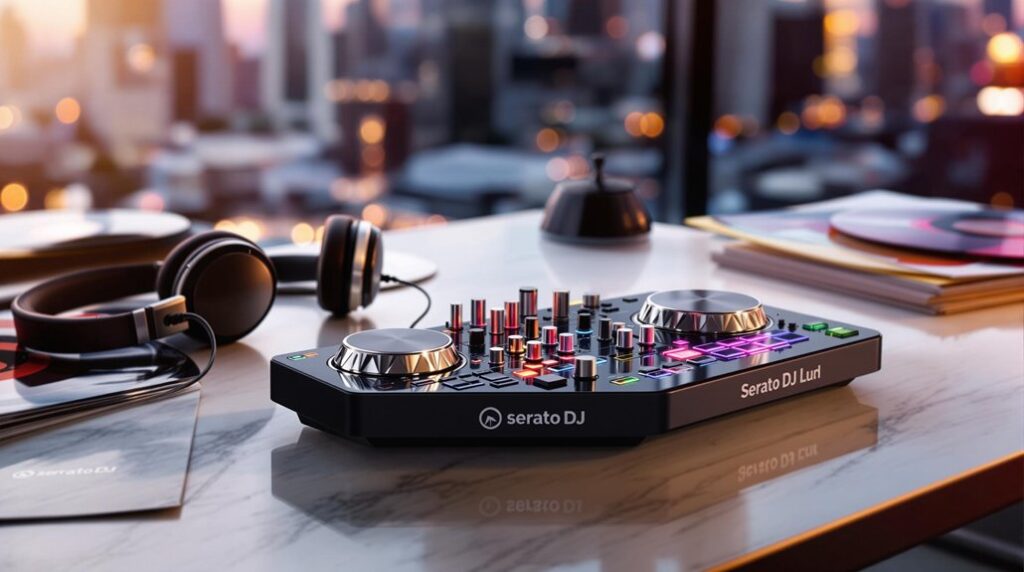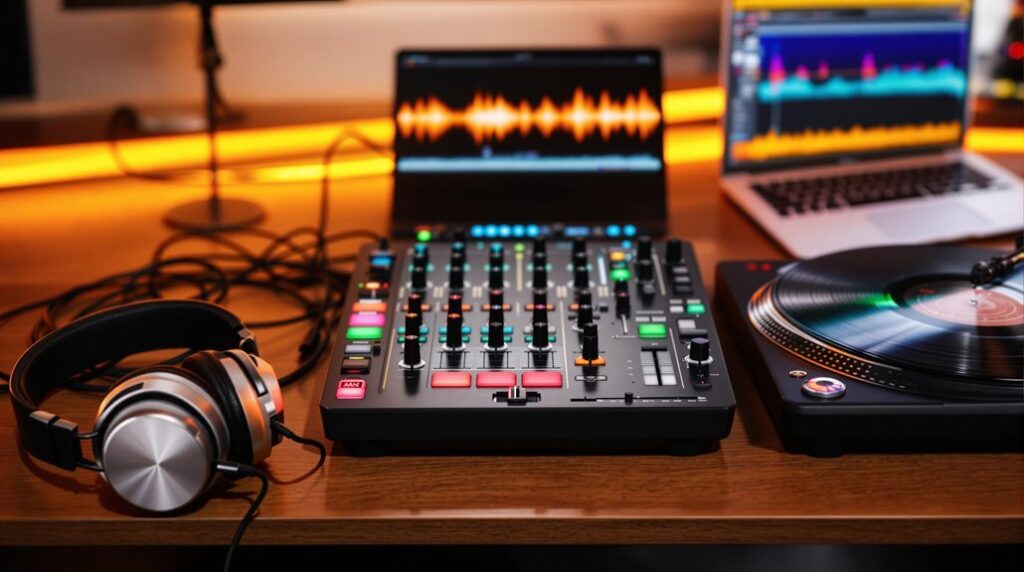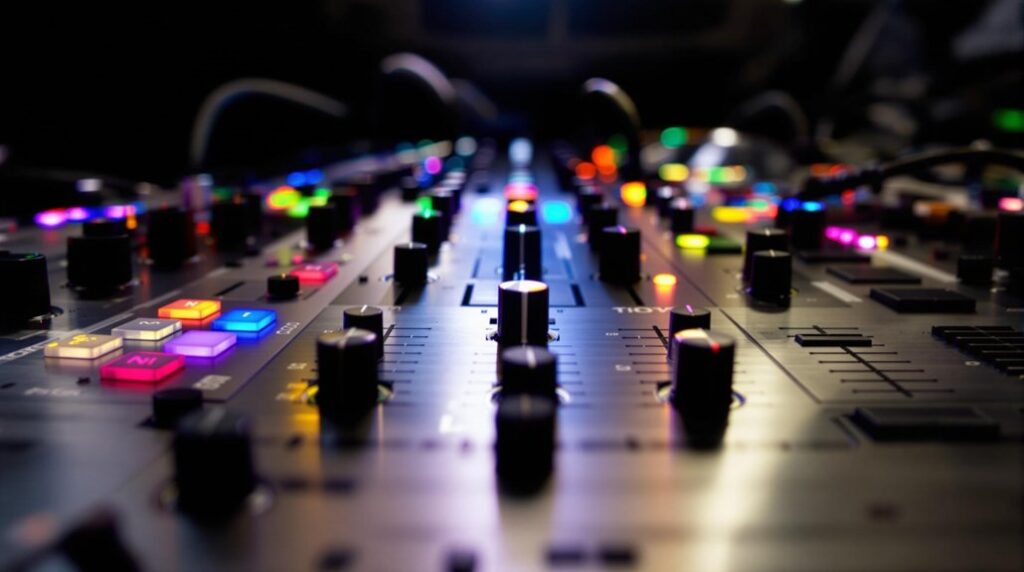Pioneer mixers cater to diverse DJing styles and needs. The DJM-250MK2 is cost-effective for beginners, while the DJM-S11 suits scratch DJs with its customizable pads. Professionals might prefer the DJM-V10's six channels or the DJM-900NXS2's advanced effects. The DJM-A9 offers superior audio quality with 32-bit converters. Each model varies in connectivity, integration, and budget, addressing specific venue demands. Exploring further can discover the most suitable mixer for your precise requirements.
Key Takeaways
- Beginner DJs should consider the DJM-250MK2 for professional features at a budget-friendly price.
- Scratch DJs benefit from the customizable performance pads of the DJM-S11 or DJM-S9.
- Professional DJs require the high audio resolution of the DJM-V10 or DJM-900NXS2.
- The DJM-A9 offers superior audio fidelity with ESS Technology 32-bit converters.
- Venue-specific needs are met with the DJM-900NXS2 for clubs, and DJM-V10 for upscale settings.
Understanding Your DJing Style and Preferences
How does one determine the ideal mixer for their DJing needs? Evaluating one's DJing style is essential.
For entry-level DJs, the DJM-250MK2 is recommended for its professional-grade features at an accessible price point, providing a practical introduction to DJ mixers.
Scratch DJs benefit from models like the DJM-S11 or DJM-S9, which offer customizable performance pads and intuitive controls tailored for intricate techniques.
Professional DJs, seeking high audio resolution and extensive sound manipulation, should consider the DJM-V10 or DJM-900NXS2, known for their advanced features.
The number of channels is another important factor; a six-channel mixer such as the DJM-V10 offers flexibility for complex setups, while two-channel mixers suffice for less complex performances.
Selecting a suitable mixer depends on these nuanced preferences.
Networking extensively at music events can significantly enhance visibility and gig opportunities for DJs.
Comparing Mixer Features and Capabilities
When evaluating mixers, understanding the distinct features and capabilities of each model is essential for DJs aiming to optimize their setup.
The Pioneer DJM-A9 stands out with its ESS Technology 32-bit converters, catering to professional environments with its superior audio fidelity.
For DJs who require extensive sound manipulation, the DJM-V10 offers a 96kHz/64-bit digital processor with versatile EQ options, ideal for complex performances.
Scratch DJs will find the DJM-S11 appealing due to its seamless software integration and customizable touch screen, enabling high-level performance techniques.
Meanwhile, the DJM-250MK2 provides novice DJs with a budget-friendly, yet professional-grade DJ mixer, featuring a durable Magvel crossfader.
For club settings, the DJM-900NXS2 provides advanced effects and dual USB inputs for smooth transitions.
Additionally, the increasing demand for mobile DJing is influencing the development of mixers with more portable and versatile features, catering to the needs of DJs on the go.
Evaluating Sound Quality and Audio Performance
While evaluating sound quality and audio performance in Pioneer mixer models, DJs must consider the technical specifications that affect audio fidelity and versatility.
The DJM-A9 employs ESS Technology 32-bit converters, offering pristine sound clarity. Its high-resolution output is complemented by the DJM-V10, which features a 96kHz/64-bit digital signal processor, enabling versatile sound manipulation with extensive EQ options.
The DJM-900NXS2 utilizes a 24-bit/96kHz soundcard, ensuring studio-quality digital signal processing for superior audio. For scratch DJs, the DJM-S9 provides 24-bit/48kHz audio processing, maintaining high-quality sound and responsive mixing.
Entry-level DJs find professional-grade sound quality features in the DJM-250MK2, with its high-quality crossfader and per-channel filters, allowing effective sound fine-tuning.
When selecting a mixer, DJs should also be aware of public performance licenses, which are essential for legally playing music in public venues. Each model caters to distinct audio performance needs.
Exploring Connectivity and Integration Options
Evaluating the connectivity and integration options of Pioneer mixer models is as important as appraising their sound quality.
The DJM-900NXS2 exemplifies professional connectivity with 4 phono, 4 digital, and 2 USB inputs, enabling seamless integration for multiple DJs. Its Pro DJ Link extends connectivity, allowing up to 4 CDJs or turntables for complex setups.
The DJM-V10 enhances creative sound manipulation with 4 stereo send/return channels, offering integration with external effects units.
For versatility, the DJM-450 supports multiple mic/aux inputs and professional XLR outputs, ensuring high-quality audio in various settings.
Notably, the DJM-SRT Mixer's seamless Serato DJ integration allows direct USB connection to PC/Mac, enhancing its adaptability in professional environments.
Significantly, the DJM-S11's dual USB ports facilitate professional DJ switchovers during live performances.
Each model provides distinct connectivity options tailored for diverse professional needs.
Assessing Build Quality and Durability
In evaluating the build quality and durability of Pioneer mixers, the selection of high-grade materials plays an essential role in their resilience, particularly in high-use environments such as clubs and professional gigs. Models like the DJM-250MK2 and DJM-450 are designed to withstand both home and club settings, while the DJM-S11 and DJM-S9 incorporate Magvel faders known for their robustness under frequent use. The integration of professional-grade components across the range guarantees that these mixers not only deliver superior sound quality but also maintain their structural integrity over time. Many Pioneer mixers also feature Key Lock functionality, allowing DJs to adjust tempo without altering pitch for seamless transitions.
Material Selection Importance
When considering the material selection in Pioneer DJ mixers, the emphasis on build quality and durability becomes evident.
Models such as the DJM-S9 and DJM-900NXS2 utilize robust materials to withstand the demands of club environments. The importance of material selection is additionally highlighted by the use of high-quality components like the Magvel crossfader in the DJM-450 and DJM-S11, which enhances both durability and performance.
Moreover, the rugged chassis design found in many Pioneer mixers is engineered to endure frequent transportation, making them suitable for mobile DJs.
Advanced audio circuitry and high-quality converters in models like the DJM-V10 and DJM-A9 not only enhance sound fidelity but also contribute to the mixers' overall durability, ensuring reliability in live performances.
Longevity in High-Use Environments
The meticulous selection of materials in Pioneer DJ mixers is intrinsically linked to their longevity in high-use environments.
Models like the DJM-900NXS2 and DJM-V10 exemplify robust construction, utilizing high-quality materials to endure the demands of professional settings such as clubs and festivals.
The customizable Magvel faders on the DJM-S9 and DJM-S11 highlight durability and precision, essential for scratch DJs who prioritize reliable performance during intense sessions.
The DJM-A9's studio-quality audio converters and high-fidelity components further guarantee longevity, particularly in high-demand performances.
Additionally, extensive connectivity options, such as dual USB inputs on the DJM-900NXS2, support seamless DJ shifts, maintaining durability through repeated setups.
Compact models like DJM-250MK2 and DJM-450 also emphasize robust construction for diverse environments.
Identifying Ideal Mixers for Different Venues
In the domain of professional audio equipment, selecting the appropriate Pioneer mixer model is contingent upon the specific requirements of the venue.
The DJM-900NXS2 is ideal for club environments, offering robust channel capacity and advanced sound processing, whereas upscale venues with complex sound demands may find the DJM-V10's additional channels and superior audio resolution advantageous.
Conversely, smaller gigs and mobile events benefit from models like the DJM-250MK2 and DJM-450, which balance essential features with portability and cost-effectiveness.
Furthermore, proper speaker placement enhances the listening experience by ensuring even sound distribution, which is crucial for effective sound clarity in large venues.
Mixer Choices for Clubs
Selecting the right mixer for a club is essential to ensuring ideal audio performance tailored to the venue's unique needs. Pioneer DJ equipment offers a range of mixers for various club settings. The DJM-900NXS2 is perfect for a professional club with its Sound Color FX and dual USB inputs. Meanwhile, the DJM-V10 caters to upscale venues with its studio-grade processing. For those seeking a budget-friendly option, the DJM-250MK2 provides quality features like a high-quality crossfader. The DJM-A9's Bluetooth capabilities offer modern integration, while the DJM-S11 excels in hosting dynamic performances.
| Model | Ideal For |
|---|---|
| DJM-900NXS2 | Professional club |
| DJM-V10 | Upscale venues |
| DJM-250MK2 | Budget-friendly option |
| DJM-A9 | Modern integration |
| DJM-S11 | Dynamic performances |
Venue-Specific Mixer Needs
When choosing a mixer for a specific venue, understanding the distinct needs and characteristics of the space is essential.
The Pioneer DJM-900NXS2 excels in clubs and professional venues with its 4-channel configuration, extensive effects suite, and dual USB inputs, facilitating seamless DJ shifts.
Conversely, larger venues may prefer the Pioneer DJM-V10 for its 6-channel setup and enhanced sound quality, ideal for complex live performances.
For mobile DJs, the Pioneer DJM-450 offers a compact yet functional solution, featuring robust connectivity for flexible DJ setups.
Entry-level venues or home studios benefit from the Pioneer DJM-250MK2, offering professional features affordably.
Meanwhile, scratch DJs should consider the Pioneer DJM-S11, designed for intricate techniques and customizable performance pads.
Reviewing Budget and Value Considerations
Although DJs often seek equipment that balances cost and functionality, the Pioneer mixer range offers models that cater to various budgetary needs without compromising on quality. For budget-conscious DJs, the DJM-250MK2 is an ideal choice, providing professional-grade features at an accessible price point of around £300. Stepping up, the DJM-450 at approximately £500 includes advanced features and is a value-rich option for both home studios and clubs. The DJM-S11 offers a middle ground for those focused on scratch mixing, balancing performance with affordability. For serious professionals, the DJM-900NXS2 delivers unparalleled sound quality at £2000, while the flagship DJM-V10, priced at £3000, offers superior flexibility and sound quality for top-tier performances. For those just starting, beginner DJs might consider exploring options like the Pioneer DJ DDJ-200, which provides intuitive layouts and seamless mobile connectivity.
Frequently Asked Questions
What Is the Difference Between Pioneer CDJ and DDJ?
The CDJ features comparison highlights standalone functionality, high-quality sound, and traditional controls. In contrast, DDJ controller advantages include compact design, built-in interfaces, and affordability, catering to diverse DJ performance styles ranging from beginners to professionals seeking versatility.
What Pioneer Do DJS Use?
In an objective analysis, Pioneer models such as the DJM-900NXS2, DJM-V10, DJM-S11, and DJM-250MK2 cater to diverse DJ preferences, offering equipment compatibility with professional settings, scratch techniques, or entry-level performance needs.
Conclusion
To summarize, selecting the ideal Pioneer mixer hinges on a thorough evaluation of individual DJing styles, venue requirements, and budget constraints. A detailed comparison of features such as sound quality, connectivity, and build durability is essential. Models offering superior audio performance and robust integration options are recommended for professional setups, while budget-friendly options still provide essential features for beginners. Ultimately, aligning a mixer's capabilities with specific needs guarantees an ideal balance of performance and value.




